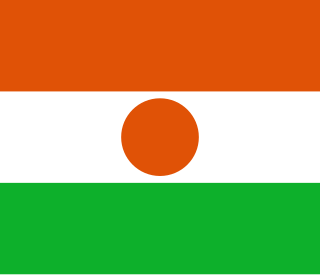
Niger or the Niger, officially the Republic of the Niger, is a landlocked country in West Africa. It is a unitary state bordered by Libya to the northeast, Chad to the east, Nigeria to the south, Benin and Burkina Faso to the southwest, Mali to the west, and Algeria to the northwest. It covers a land area of almost 1,270,000 km2 (490,000 sq mi), making it the second-largest landlocked country in West Africa, after Chad. Over 80% of its land area lies in the Sahara. Its predominantly Muslim population of about 25 million live mostly in clusters in the further south and west of the country. The capital Niamey is located in Niger's southwest corner.

Kogi State is a state in the North Central region of Nigeria, bordered to the west by the states of Ekiti and Kwara, to the north by the Federal Capital Territory, to the northeast by Nasarawa State, to the northwest by Niger State, to the southwest by the Edo and Ondo states, to the southeast by the states of Anambra and Enugu, and to the east by Benue State. It is the only state in Nigeria to border ten other states. Named for the Hausa word for river (kogi). Kogi State was formed from parts of Benue State, Niger State, and Kwara State on 27 August 1991. The state is nicknamed the "Confluence State" due to the fact that the confluence of the River Niger and the River Benue occurs next to its capital, Lokoja.

Sir George Dashwood Taubman Goldie was a Manx administrator who played a major role in the founding of Nigeria. In many ways, his role was similar to that of Cecil Rhodes elsewhere in Africa but he did not seek publicity.

The Royal Niger Company was a mercantile company chartered by the British government in the nineteenth century. It was formed in 1879 as the United African Company and renamed to National African Company in 1881 and to Royal Niger Company in 1886. In 1929 the company became part of the United Africa Company, which came under the control of Unilever in the 1930s and continued to exist as a subsidiary of Unilever until 1987, when it was absorbed into the parent company.

The Niger Coast Protectorate was a British protectorate in the Oil Rivers area of present-day Nigeria, originally established as the Oil Rivers Protectorate in 1884 and confirmed at the Berlin Conference the following year. It was renamed on 12 May 1893, and merged with the chartered territories of the Royal Niger Company on 1 January 1900 to form the Southern Nigeria Protectorate.
This is a survey of the postage stamps and postal history of the Niger Coast Protectorate.

Nigeria is one of the largest oil and gas producers in Africa. Crude oil from the Niger delta basin comes in two types: light, and comparatively heavy – the lighter has around 36 gravity while the heavier has 20–25 gravity. Both types are paraffinic and low in sulfur. Nigeria's economy and budget have been largely supported from income and revenues generated from the petroleum industry since 1960. Statistics as at February 2021 shows that the Nigerian oil sector contributes to about 9% of the entire GDP of the nation. Nigeria is one of the largest oil and gas producer in Africa, being a major exporter of crude oil and petroleum products to the United States of America. In 2010, Nigeria exported over one million barrels per day to the United States of America, representing 9% of the U.S. total crude oil and petroleum products imports and over 40% of Nigeria exports.

Shell Nigeria is the common name for Shell plc's Nigerian operations carried out through four subsidiaries—primarily Shell Petroleum Development Company of Nigeria Limited (SPDC). Royal Dutch Shell's joint ventures account for more than 21% of Nigeria's total petroleum production.

Colonial Nigeria was ruled by the British Empire from the mid-nineteenth century until 1960 when Nigeria achieved independence. British influence in the region began with the prohibition of slave trade to British subjects in 1807. Britain annexed Lagos in 1861 and established the Oil River Protectorate in 1884. British influence in the Niger area increased gradually over the 19th century, but Britain did not effectively occupy the area until 1885. Other European powers acknowledged Britain's dominance over the area in the 1885 Berlin Conference.
Agenebode is a historical water-side town located by the banks of the Niger River in Edo State, South South part of Nigeria. It is the headquarters of Etsako-East local Government Area, the host of the local council and the traditional capital of Weppa Wanno Clan/Kingdom.

This is a survey of the postage stamps and postal history of the Southern Nigeria Protectorate.
Sani Bello is a Nigerian statesman and military administrator who served as Governor of Kano State from 1975 to 1978. After his retirement, he amassed an enormous fortune through investments in oil, telecommunications and electricity; going on to establish the Sani Bello Foundation.

This is a survey of the postage stamps and postal history of the Niger Territories, an area between the Forcados and Brasse Rivers, once administered by the Royal Niger Company but now part of modern Nigeria.

Nigerian nationality law is regulated by the Constitution of Nigeria, as amended, and various international agreements to which the country is a signatory. These laws determine who is, or is eligible to be, a national of Nigeria. The legal means to acquire nationality, formal legal membership in a nation, differ from the domestic relationship of rights and obligations between a national and the nation, known as citizenship. Nationality describes the relationship of an individual to the state under international law, whereas citizenship is the domestic relationship of an individual within the nation. Commonwealth countries often use the terms nationality and citizenship as synonyms, despite their legal distinction and the fact that they are regulated by different governmental administrative bodies. Nigerian nationality is typically obtained under the principal of jus sanguinis, i.e. by birth to parents with Nigerian nationality. It can be granted to persons with an affiliation to the country, or to a permanent resident who has lived in the country for a given period of time through naturalisation.
Daniel Wycliffe Sargent was an early explorer of Africa, Agent General of the British Government who signed treaties with many African chiefs which allowed the British to establish the Southern Nigeria Protectorate. Sargent was listed as the Agent General of the Royal Niger Company 1889 in Akassa. His brother Edward Sargent was the English American Architect. Daniel Sargent had three wives. The second wife was the African chief's daughter Utsekanua born in Iddah, River Niger, West Africa 1856. They had one daughter, Ellen.
The Compagnie du Sénégal (SCOA), officially the Compagnie du Sénégal et de la Côte occidentale d'Afrique was a 19th-century colonial French company involved in the palm oil trade in Nigeria.

Bartlam's Store is a heritage-listed former pair of shops and now museum at Mosman Street, Charters Towers City, Charters Towers, Charters Towers Region, Queensland, Australia. It was built from c. 1891 to 1940s. It is also known as Burns Philp & Company Limited and Wright Heaton & Company. It was acquired by the National Trust in 1978, and the Zara Clark Museum was subsequently established in the building. It was added to the Queensland Heritage Register on 21 October 1992.
Alexander Miller was a Scottish merchant who was principal shareholder Miller Brothers along with his brother, George Miller. The firm was one of the four companies trading up the Niger River that merged to form the Royal Niger Company which held a Royal charter in the territories constituting most of Northern Nigeria Protectorate. After the merger, he became joint managing director and moved his offices from Glasgow to London.

The Royal Niger Company’s Medal was a campaign medal issued in 1899 by the Royal Niger Company for service in minor military operations in Nigeria between 1886 and 1897. The award was approved by the British government and could be worn by British servicemen.
Omotayo Alasoadura is a Nigerian politician. He was the former Minister of State for Niger Delta Affairs appointed by President Muhammadu Buhari.